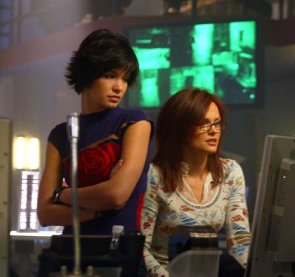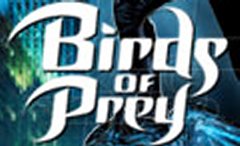Some weird ratings irony struck the WB last week. While the numbers for Birds of Prey went down, the show quality actually went up. It's still finding its way, but at least the producers have dropped most of the irritating touches that made fans roll their eyes so hard you could hear it.
It still borrows too heavily from the shows that it wants to be. Now Alfred narrates an explanation at the top, ripped straight from Charlie's Angels. To be fair, the early episodes of Buffy The Vampire Slayer did the same thing, but they had the good sense to drop it.
And speaking of Buffy, Dinah's character still reads as a pale knock-off of Dawn. At least the show has begun planting an explanation for it. Like most of the dramatic subplots, however, nobody wants to give the distrust of Dinah time to develop.
We knew from the pilot that Helena resented the new girl. By this, only the second episode, it has blossomed into near-paranoia. Barbara feeds that by researching Dinah's past and discovering that "everything she told (them) is a lie…" (insert your preferred dramatic organ sting here). When Dinah peeps over the balcony wearing Helena's favorite sweater, well, that's the last straw.
Note: They're not sisters. Let's repeat that so maybe folks at the WB will understand: they're not sisters. Despite the easiness of that development, even the comic books don't try that crap between Batgirl and The Spoiler, the closest analog to the relationship on the TV show.
The conflict allows for a couple of pithy statements to get thrown around. Helena spits: "trust has to be earned!" (Later, she recants that in a Lifetime Channel moment that I really, really hope doesn't become part of a pattern for the show.) Expressing a different point of view, Alfred twinkles, "the surest sign of how much a person cares about you is how good you are at pissing them off."
At first that seems awfully stupid, but you have to remember that the estimable Mr. Pennyworth spent most of his life caring for a guy for whom being pissed off meant it was a good day. At least when Alfred weighs in, this week we didn't have that strange Highlander music playing.
Overall, the soundtrack pulled back, which is a great development. Sure, there's still a lot of interstitial theme music that borrows heavily from Elfman, but that part works. The quality of the show actually doubled by removing the wildcat noises from The Huntress' fight scenes. I'm not kidding.
Actually, the fight scenes themselves also helped. Between the pilot and second episode, somebody pointed out that you have to actually be able to see fighting for it to be exciting. (Oh, heck, the last two Batman movies could have used that lesson, too.) Ashley Scott and/or her stuntwoman have some good moves, while Shemar Moore does a smooth job looking on in helpless terror.
Ah, yes. Moore's Detective Reese clearly serves the purpose of being the useless man-hunk here. He sweats much, much better than Ashley Scott does, and annoyingly, the camera thinks so, too. I'm all for giving a little something for the ladies, but why strip The Huntress down if all we're going to see is Moore's sweaty chest and abs? All it does is remind me I need to do more sit-ups.
The character of Reese is clearly unfocused; on the one hand he believes that something strange happens in New Gotham at night, and finds himself attracted to The Huntress. But he also refuses to believe that a man can transform himself into water. Comic fans will be used to this supporting character dichotomy, but a television viewer sees it for the cheap cliché it is. This isn't the world of Sunnydale, where the supernatural has the good sense to lay low until it can claim its victims. In New Gotham, supervillains (and they throw that word around liberally) used to run rampant. Last week in an interview, Moore himself revealed that Reese's father was a supervillain who ran with The Joker. So why does the guy have such a problem believing in them?
 |
In a rare moment of subtle character development, Reese does only hint at the supervillain connection. Such moments give me hope that the series will find stronger footing. Most of the time, the show grinds to a halt to deliver exposition and backstory, such as a lecture from Barbara to Helena about their heritage. She ticks off a list of those who came before - Dick Grayson, Jason Todd, Tim Drake…ladies and gentlemen, we will start a betting pool as to when one of them shows up. (Except for Jason, of course, because he's dead, something that Helena doesn't see fit to point out.) Actually, it would be cool to see one of them - as long as they don't have nipples on their suits.
Though still bluntly told, we now know that Dinah ran away from foster parents who tried to squelch her powers. (In a scene drastically chopped in the pilot, her foster mother was shown trying to convince the girl that her psychic abilities were just a bad dream, with hints of physical abuse attached.) This sets the stage for the real Black Canary to show up in a few episodes, already cast as Lori Loughlin from Full House.
The best character development still lies in the handling of Harley Quinn. Mia Sara continues to do an impressive job as a psychopath trying to keep on a lid of sanity. Rather than spell out her origin, she alludes to it by dropping a line about her beloved "Mr. J," now locked up in prison. So guess what, kids? The Joker is alive and well, which seems to be a revelation, and otherwise Harley's origin can be exactly what it is in the animated series and comics without having to rush the revelation.
Though this show has a better rationale for "freak of the week" than Smallville, it's already showing signs of a disturbing pattern. Crime, fight, flirt with Reese, Dinah steps in for last minute rescue, the three hug, Barbara and Helena watch the dawn from the Clocktower then realize, hey! There was a secret mastermind! Then we end on a scene with Harley Quinn. Or vice versa on those last two.
Here's hoping the next episode breaks that pattern, because that will give the show another leap in quality.







